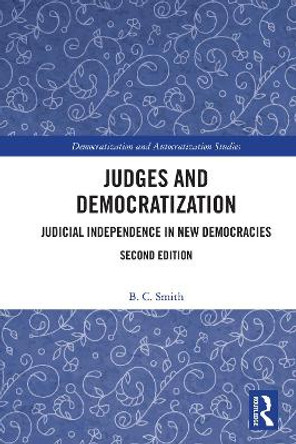Description
About the Author
Brad Epperly is Assistant Professor of Political Science at the University of South Carolina, where he has received the university's highest award for undergraduate teaching. His research on the rule of law appears in numerous journals, including Comparative Political Studies, Perspectives on Politics, and the Journal of Law and Courts.
Reviews
... a fascinating book about judicial independence across regime types... This book is an important contribution to comparative politics and the academic literature on law and courts... I recommend this book to a wide audience - from those interested in democratization and authoritarian politics to scholars focusing on Central and Eastern Europe. The empirics are presented in a clear and coherent way, which will also benefit those interested in statistical methods of analysis of cross-national data. On a personal note, this book is a brilliant example of a well-written and engaging study, and it is now one of my favourite readings on law and courts. * Yulia Khalikova, University of Bremen and Jacobs University, Democratization *
One of our best young scholars of law and courts has produced a superb account of judicial independence in both democracies and autocracies. Methodologically rigorous and tightly argued, this is an essential contribution to our understanding of the politics of judicial empowerment. * Tom Ginsburg, Leo Spitz Professor of International Law, Ludwig and Hilde Wolf Research Scholar, Professor of Political Science, University of Chicago *
Brad Epperly's book encourages us to rethink political science's central theory of judicial independence. By carefully analyzing both the logical and empirical foundations of the insurance model of judicial independence, Epperly provides a number of fresh insights into the conditions under which dictators and democrats opt for judicial independence. Most importantly, Epperly's argument highlights how the stakes of leaving office shape leaders' preferences for judicial independence and thus illuminates the seeming paradox of why dictators facing competitive elections are especially prone to insulate their judiciaries. This book should become standard reading for anyone interested in comparative courts and autocratic institutions. * Gretchen Helmke, Professor of Political Science, University of Rochester *
Perceptions that leaders will step down after losing elections is broadly understood to be a key driver of judicial independence. Judicial independence is thus a feature of democracy. Brad Epperly's account suggests that authoritarian leaders also construct independent courts when they perceive increases in political competition. Epperly's work brings together careful theorizing, rigorous empirical analysis and attention to particular cases to offer a novel and provocative account of the political origins of judicial independence. * Jeffrey Staton, Professor of Political Science, Director of the Center for the Study of Law, Politics, and Economics, Emory University *
Professor Epperly examines and expands insurance theory in a new and novel way by proposing that the level of electoral competition conditions the propositions derived from insurance theory in both democratic and authoritarian regimes... This book is important for bridging the divide between the findings of quantitative studies and the finding of qualitative case studies of judicial independence. Professor Epperly's book is an important contribution to comparative judicial politics, comparative institutionalism, international legal studies, and international relations research, as well as of great relevance for students of neo-authoritarian research. * Lee Walker, Associate Professor of Political Science, University of North Texas *
Book Information
ISBN 9780198845027
Author Brad Epperly
Format Hardback
Page Count 218
Imprint Oxford University Press
Publisher Oxford University Press
Weight(grams) 460g
Dimensions(mm) 240mm * 160mm * 18mm









